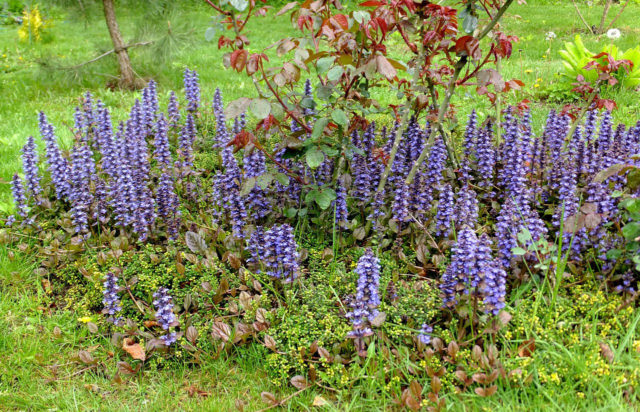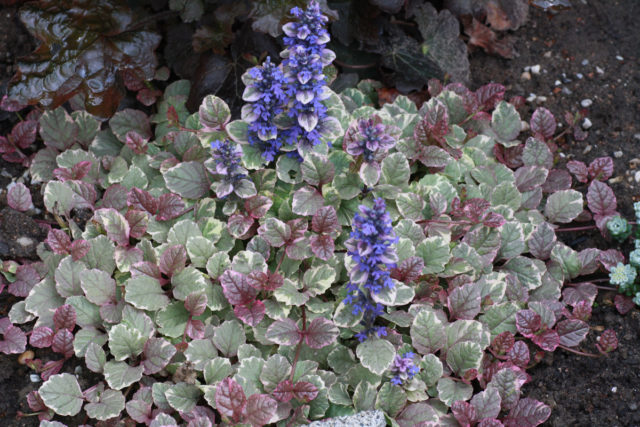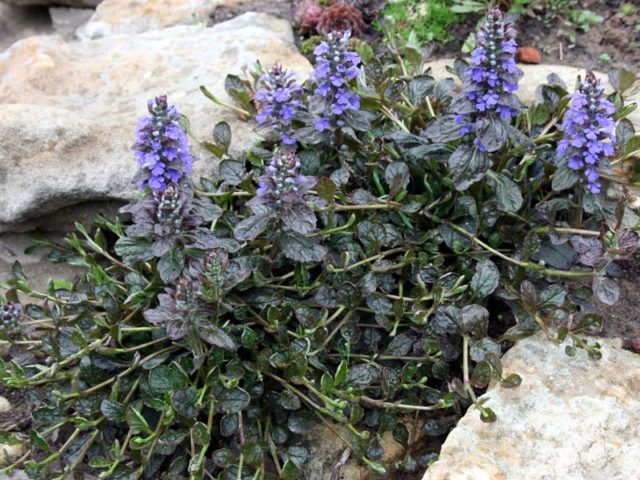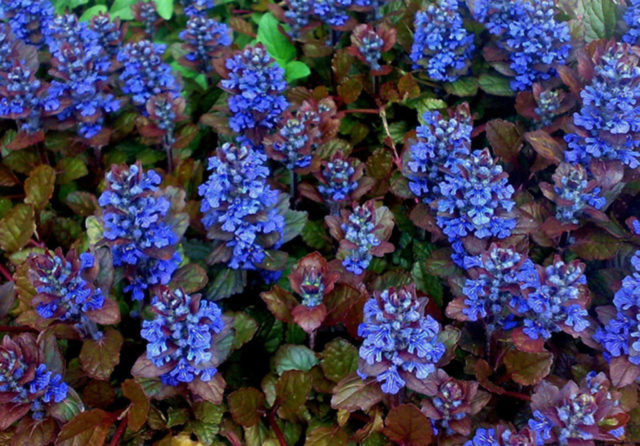Content
The tenacious creeping in landscape design has earned special love for its amazing covering properties - there will be no room for weeds and other plants in the dedicated area. In the common people, it has a large number of "speaking" names: bitter, dubrovka, unfading and non-fading. They perfectly characterize its endurance and vitality.

With the help of the tenacious, they create beautiful compositions, and also fill rockeries and mixborders
The temperate latitudes of the Northern Hemisphere, as well as Africa and even Australia, are inhabited by numerous species of the creeping tenacious. Its varieties differ from each other not only by the color of the flowers, but also by the leaves themselves.
In fact, it is a herbaceous perennial with an average height of 8-35 cm, which explains its good covering properties. At the same time, Ayuga peduncles rise above the foliage to a height of 15 cm, so their bright blue color is noticeable from a distance.
The healing properties of the herb creeping tenacious
The chemical composition of the leaves and shoots of the creeping tenacious includes numerous elements:
- tannins;
- vitamin C;
- flavonoids;
- vitamin K;
- steroids;
- essential oil.
Therefore, Ayuga is known not only for its decorative properties, but it is also actively used in folk medicine. The plant has the following actions:
- expectorant;
- antiseptic;
- wound healing and astringent;
- diuretic;
- hemostatic;
- diuretic;
- diaphoretic;
- anti-inflammatory.
Most often, with the help of a creeping tenacious, inflammatory diseases of the female genital organs, respiration, including pulmonary tuberculosis, rheumatism, and pathological processes in the nasopharynx are treated. To restore the skin after burns, Ayuga juice is used, which has an antimicrobial effect.
As with any medicinal plants, there are a number of contraindications in the case of the creeping tenacious. It should not be used if you have a tendency to constipation. In addition, the plant has a very strong choleretic effect. In these cases, it is necessary to carefully observe the dosage and apply the herb with caution.
Most often, creeping tenacious is used in the form of infusions, which are prepared differently for each disease. In addition, tea is made on the basis of the herb to reduce body temperature, added to salads, and crushed leaves are used to treat various wounds and cuts. In cosmetology, the tenacious has also found its own sphere: the use of an infusion based on it helps to stimulate hair growth.
Reproduction of Perennial Tenacious
Perennial Ayuga is propagated using seeds or vegetatively. At the same time, much depends on the purpose of planting - if it is a decorative decoration of the garden, then it is recommended to resort to dividing the tenacious rosette. This method is the most popular and simplest.
Growing a thumbscrew from seeds
Seeds for sowing Ayuga can be purchased in a specialized store, or collected from flowers yourself. The first option is the most preferable for the tenacious.

It is not recommended to store seeds collected by yourself for a long time, since they quickly lose varietal characteristics - leaves and inflorescences in color may differ from the original ones
There are 2 options for planting a plant:
- In the spring - sowing can be started in mid-April, when the soil warms up a little.
- In autumn - sowing is carried out before the snow. Then, with the onset of heat, the first shoots will already appear, and the creeping tenacious itself will bloom earlier. In addition, it will be even more hardy than spring seedlings.
In any planting option, there is no need to pre-sow seeds in boxes - this is done immediately in open ground. Fertilizers are applied to the selected area - superphosphate, or mineral and organic. Several seeds of the tenacious are placed in the grooves, which are covered with a small amount of earth on top, watered.
With a large planting area of the creeping tenacious, another breeding option is also possible - self-seeding. But it is not suitable for landscape design, since plants grown in this way will become a different variety, which means they will differ significantly from the original species. In this case, you need to track the fading flower stalks in order to cut them off in time.
Bush rosettes
The vegetative method involves reproduction by division. To do this, an adult plant must be divided into sockets at least once a year. The procedure is carried out in September or early spring. In this case, they use only an overgrown creeping tenacious. A prerequisite is that the outlet must have a spine.
In the spring, you can plant outlets in mid-May. Even if there is a slight frost, the sprouts will not die - they can withstand short frosts down to -9 ° C. The distance between the seedlings of the creeping tenacious should be at least 30 cm, as they grow rapidly. Of the necessary conditions - regular watering until rooting. In this case, the green part is strictly left above the surface of the earth, and watered carefully, using a watering can, so as not to expose the roots.
Planting and caring for the creeping creeper in the open field
No special care for the Ayuga is required, which is why gardeners appreciate it. Minimal maintenance allows you to quickly create a beautiful grassy carpet on the site.

During flowering from May to June, the tenacious covers the planted area with a solid carpet of blue and blue flowers
Ayugi landing dates
If necessary and desired, you can plant and transplant Ayuga all summer: from April to mid-September. But, planting a tenacious plant in the fall, you can get a green cover in the very early spring.
Site and soil requirements
There are also no special requirements for soil or planting site. Partial shade is ideal for her, so under the crown of trees, around shrubs or roses, the Ayuga will feel great. The scorching sun also will not kill the creeping tenacious, therefore it is planted along the paths.
The soil can be any, but there is a slight difference in the care. The ideal would be - a loamy area rich in humus - it is able to provide the necessary moisture. Ayuga also grows well on sandy soils, but watering should be more frequent to maintain its healthy appearance.
Planting and watering
Unpretentious Ayuga is planted almost everywhere. Moreover, the tenacious can grow well for several years in the same flower bed. The only condition is that once every 5 years it will be necessary to feed it with nitrogen.
It does not need regular and constant watering - it will survive even in dry periods. But in order to preserve the decorative properties, this still sometimes has to be done. Particular attention is paid to moisture during the sowing or planting of tenacious seedlings.
Top dressing
In nature, the creeping tenacious is able to survive on the poorest soils, but for ornamental varieties it is recommended to use top dressing - this helps to maintain a healthy and blooming appearance of the grass in the garden. For this, peat oxidate, or any other universal complex fertilizer, is quite suitable.It is enough to use it once a month.
Preparing for winter
Ayuga is able to withstand even very harsh winters, but only with shelter. During the snowy period, no preparatory activities are carried out. But if frosts are already coming, and there is still no snow, you need to take care of the creeping tenacious. To do this, use any breathable covering material - sawdust, fallen leaves, spruce branches.
Collection and storage of herbs
For medicinal purposes, flowers, leaves and stems of the creeping tenacious are used. It is necessary to prepare them during the flowering period: May-June. The raw material is carefully dried - it should have a light, pleasant aroma, but an astringent bitter taste. You can store the workpiece for a whole year in a dry place using paper or canvas bags.
Diseases and pests
The decorative creeping tenacious practically does not get sick and is immune to pests. There are just a few problems that gardeners can face:
- fungal diseases - they happen extremely rarely, most often in abandoned gardens or wildlife;
- snails and slugs are able to take a fancy to the site in the rainy season; to protect against them, sprinkle with lime or salt around the Ayuga.
Tenacious creeping in garden landscaping
The name of the survivor speaks for itself - if you do not follow it, it will "creep" all over the site. And despite the decorative variety, it will look more like an annoying weed. To do this, you just need to cut off the flowering inflorescences in time.
With what to plant the creeping zhivuchka

She feels great next to trees and shrubs, as she is not afraid of the shade
In this regard, the creeping tenacious is often planted next to roses, with conifers and shrubs, instead of a lawn on the darkened side. It would be a great idea to complement the shores of an artificial reservoir with ayuga.
But, given that the tenacious can survive even weeds from its plot, there is no need to plant "delicate" plants next to it. In the neighborhood, roses, ferns, geraniums, hosts, as well as some types of carnations, will feel great, as mentioned above.
Conclusion
The tenacious creeping in landscape design is one of the few perennial plants, the care of which is practically zero. The absence of diseases and high vitality make it an indispensable element of the garden plot, especially in our climate.
A video review about a tenacious helps many people to decide on planting a plant in their area.








